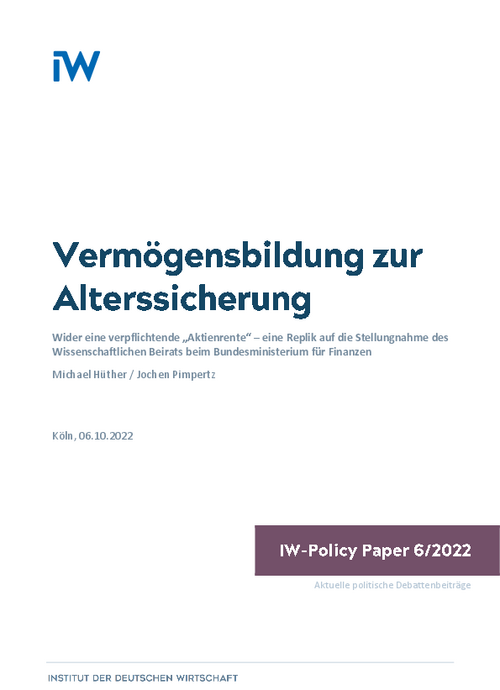The pay-as-you-go statutory pension insurance is intended to protect workers in Germany from having to rely on tax-financed assistance in old age. However, due to the ageing of society the security level of the statutory pension insurance must decrease.

Asset accumulation for retirement provision

The pay-as-you-go statutory pension insurance is intended to protect workers in Germany from having to rely on tax-financed assistance in old age. However, due to the ageing of society the security level of the statutory pension insurance must decrease.
Therefore, a compulsory funded supplementary pension scheme is being discussed to prevent the number of retirees relying on support from increasing. Yet, the economic reason for an obligation could be to prevent free-rider behaviour. This is because households that would be able to provide for themselves but voluntarily forego doing so could otherwise place an unjustified burden on the welfare state. However, this argument is not convincing.
On the one hand, those who have less than minimum income are entitled to means-tested assistance. This check already prevents free-rider behaviour. Low-income earners, on the other hand, who are not currently dependent on support but can only expect a low statutory pension, would have to be additionally subsidised. Otherwise, their income risks falling below the means threshold due to the savings obligation. Moreover, since low pensions are topped up in old age without means-testing, the resulting disincentive for the labour supply decision threatens to be reinforced with an additional pension obligation. Finally, the need for assistance could arise in cases in which where it would be possible to provide for oneself and no need is expected in old age, but this nevertheless occurs in future due to unexpected interruptions in employment. If compulsory insurance in this case is to be justified by the avoidance of unforeseeable needs for assistance, then it not only supplements compulsory social insurance, but even replaces it.
So far, little attention is paid to possible welfare losses that households would suffer if they preferred to accumulate assets to provide for old age but were forced to build up pension provisions. Since a compulsory supplementary pension scheme also sets the criteria for opting out, such households would be forced into non-preferential provision. Empirical evidence shows, however, that asset accumulation plays an important role in households’ old-age security. Nevertheless, free-rider behaviour could occur if the assets are used up prematurely, creating the risk of needing assistance. To avoid this, it is not necessary to agree on a pension plan at the beginning of working life. Instead, it would be sufficient to place a subsidised accumulation of assets under a reservation of use, which can be decided on at the time of retirement access. If pension payment is then sufficient to avoid recourse to tax-financed assistance, the accumulated assets could just as well be paid out in one sum without creating an incentive for free-rider behaviour.

Asset accumulation for retirement provision

More on the topic

Expenditures and Revenues in Germany’s Statutory Health Insurance
Almost annually recurring deficits in Germany’s statutory health insurance system have led to a steady rise in the contribution rate, a percentage of earned income.
IW
Changing Germany's Statutory Pension Insurance: An Empirical Study of Popular Aversion to Reforms
The demographic transition is putting the German statutory pension insurance system under enormous pressure to reform. Despite widespread concern, no reform of the adjustment mechanisms incorporated into the pension system meets with the approval of a majority ...
IW